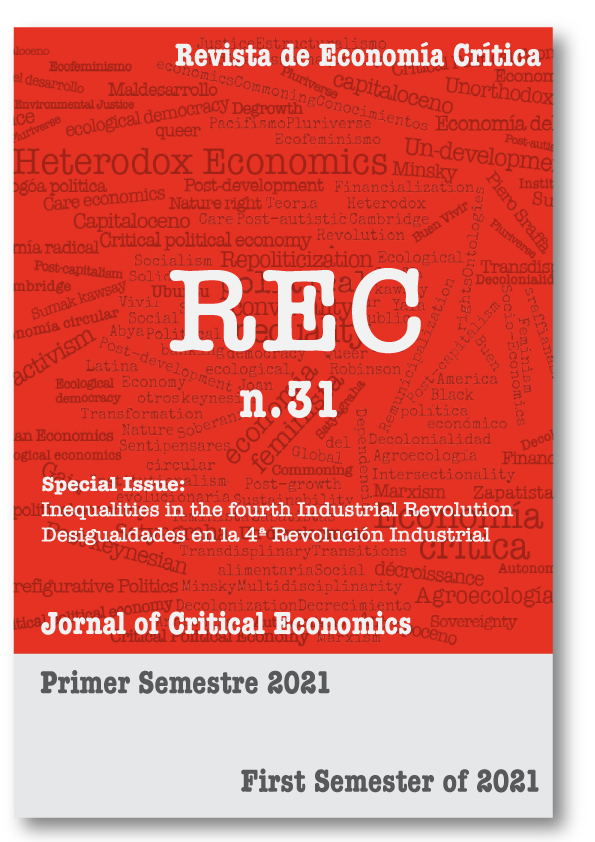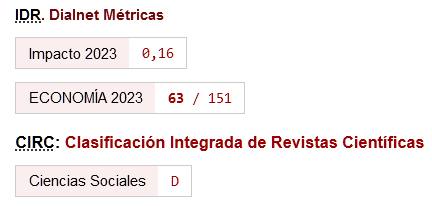El teletrabajo a domicilio: la implicación en el bienestar de los trabajadores y el impacto de género
DOI:
https://doi.org/10.46661/rec.10537Palabras clave:
work-related stress, home-based teleworking, gender inequalities, work-life balanceResumen
El teletrabajo a domicilio se está volviendo cada vez más común y con él la desmaterialización de la frontera entre la vida laboral y personal. Si, por un lado, esta forma de trabajo aumenta el poder de decisión del trabajador, por otro lado podría dañar gravemente su bienestar. Este documento explora la influencia de las condiciones organizativas en el estrés relacionado con el trabajo de una muestra de teletrabajadores a domicilio extraída de la Encuesta europea de condiciones laborales de 2015. También utiliza la Encuesta de Vida, Trabajo y COVID-19 2020 para analizar la evolución de las diferencias de género en el teletrabajo, de 2015 a 2020. Encontramos que el estrés percibido de los teletrabajadores a domicilio se debe principalmente a las formas de ordenación del tiempo de trabajo y la intensificación del trabajo, por ejemplo la falta de elección sobre el ritmo de trabajo, trabajar con plazos ajustados y a alta velocidad, trabajar en el tiempo libre para satisfacer las demandas laborales. Las teletrabajadoras también perciben que la falta de elección en la ordenación del tiempo de trabajo y la falta de tiempo de recuperación aumentan su estrés. El análisis también documenta un fuerte aumento en el nivel de estrés percibido de 2015 a 2020 y niveles más altos de estrés en las mujeres, principalmente debido a problemas de conciliación. Este diferencial de estrés por género es razonablemente constante en los dos períodos y, por tanto, tanto en la emergencia como en el teletrabajo normal. El acuerdo general en la literatura de que el teletrabajo es una forma de promover un mejor bienestar y equilibrio entre la vida laboral y personal de los trabajadores, especialmente para las mujeres, no está respaldado por nuestros hallazgos.
Descargas
Citas
Albano, Roberto, Ylenia Curzi, Tania Parisi & Lia Tirabeni. "Perceived autonomy and discretion of mobile workers". Studi Organizzativi, n. 2 (2019): 31–61. https://doi.org/10.3280/SO2018-002002. DOI: https://doi.org/10.3280/SO2018-002002
Allen, Tammy. "Family-Supportive Work Environments: The Role of Organizational Perceptions". Journal of Vocational Behavior 58 (2001): 414–35. https://doi.org/10.1006/jvbe.2000.1774. DOI: https://doi.org/10.1006/jvbe.2000.1774
Ahrendt, Daphne, Jorge Cabrita, Eleonora Clerici, John Hurley, Tadas Leončikas, Massimiliano Mascherini, Sara Riso & Eszter Sandor. "Living, Working and COVID-19", s.d., 80.
Azad, Bijan, Randa Salamoun, Anita Greenhill & Trevor Wood-Harper. "Performing projects with constant connectivity: Interplay of consulting project work practices and smartphone affordances". New Technology, Work and Employment 31 (2016): 4–25. https://doi.org/10.1111/ntwe.12061. DOI: https://doi.org/10.1111/ntwe.12061
Åkerstedt, T, A Knutsson, P Westerholm, T Theorell, L Alfredsson & G Kecklund. "Sleep Disturbances, Work Stress and Work Hours: A Cross-Sectional Study". Journal of Psychosomatic Research 53, n. 3 (2002): 741–48. https://doi.org/10.1016/S0022-3999(02)00333-1. DOI: https://doi.org/10.1016/S0022-3999(02)00333-1
Arredondo M., M. Sabaté, N. Valveny, M. Langa, R. Dosantos, J. Moreno & L. Botella. "A mindfulness training program based on brief practices (M-PBI) to reduce stress in the workplace: a randomised controlled pilot study". International Journal of Occupational and Environmental Health 23, n. 1 (2017): 40–51. https://doi.org/10.1080/10773525.2017.1386607. DOI: https://doi.org/10.1080/10773525.2017.1386607
Bae, Kwang Bin, David Lee & Hosung Sohn. "How to Increase Participation in Telework Programs in U.S. Federal Agencies: Examining the Effects of Being a Female Supervisor, Supportive Leadership, and Diversity Management". Public Personnel Management 48, n. 4 (2019): 565–83. https://doi.org/10.1177/0091026019832920. DOI: https://doi.org/10.1177/0091026019832920
Barbuto, Alyssa, Alyssa, Gilliland, Rilee, Peebles, Nicholas Rossi, & Turner, Shrout. "Telecommuting: Smarter Workplace.". http://hdl.handle.net/1811/91648.
Baruch, Yehuda & Nigel Nicholson. "Home, Sweet Work: Requirements for Effective Home Working". Journal of General Management, 8 march 2017. https://doi.org/10.1177/030630709702300202. DOI: https://doi.org/10.1177/030630709702300202
Bélanger, France. "Workers' Propensity to Telecommute: An Empirical Study". Information & Management 35, n. 3 (1999): 139–53. https://doi.org/10.1016/S0378-7206(98)00091-3. DOI: https://doi.org/10.1016/S0378-7206(98)00091-3
Bell, Amanda S., Diana Rajendran & Stephen Theiler. "Job Stress, Wellbeing, Work-Life Balance and Work-Life Conflict among Australian Academics". E-Journal of Applied Psychology 8, n. 1 (2012): 25–37. https://doi.org/10.7790/ejap.v8i1.320. DOI: https://doi.org/10.7790/ejap.v8i1.320
Biron, Michal & Marc Veldhoven. "When control becomes a liability rather than an asset: Comparing home and office days among part-time teleworkers". Journal of Organizational Behavior 37 (2016): 1317-1337. https://doi.org/10.1002/job.2106. DOI: https://doi.org/10.1002/job.2106
Boell, Sebastian, Dubravka Cecez-Kecmanovic & John Campbell. "Telework paradoxes and practices: the importance of the nature of work". New Technology, Work and Employment 31 (2016): 114–31. https://doi.org/10.1111/ntwe.12063. DOI: https://doi.org/10.1111/ntwe.12063
Casper, Wendy, Kevin Fox, Traci Sitzmann & Ann Landy. "Supervisor Referrals to Work-Family Programs". Journal of occupational health psychology 9 (2004): 136–51. https://doi.org/10.1037/1076-8998.9.2.136. DOI: https://doi.org/10.1037/1076-8998.9.2.136
Cavazotte, Flavia, Ana Lemos & Kaspar Villadsen. "Corporate Smart Phones: Professionals' Conscious Engagement in Escalating Work Connectivity". New Technology, Work and Employment 29 (2014): 72-87. https://doi.org/10.1111/ntwe.12022. DOI: https://doi.org/10.1111/ntwe.12022
Chesley, Noelle. "Information and Communication Technology Use, Work Intensification and Employee Strain and Distress". Work, Employment and Society 28, n. 4 (2014). https://doi.org/10.1177/0950017013500112. DOI: https://doi.org/10.1177/0950017013500112
Cooper, Cary L. & Judi Marshall. "Occupational Sources of Stress: A Review of the Literature Relating to Coronary Heart Disease and Mental Ill Health". In From Stress to Wellbeing Volume 1: The Theory and Research on Occupational Stress and Wellbeing, a cura di Cary L. Cooper, 3–23. London: Palgrave Macmillan UK, 2013. https://doi.org/10.1057/9781137310651_1. DOI: https://doi.org/10.1057/9781137310651_1
Curzi, Ylenia, Tommaso Fabbri & Barbara Pistoresi. "The Stressful Implications of Remote E-Working: Evidence from Europe". International Journal of Business and Management 15, n. 7 (2020): p108. https://doi.org/10.5539/ijbm.v15n7p108. DOI: https://doi.org/10.5539/ijbm.v15n7p108
Dahlgren, Anna, Göran Kecklund & Torbjörn Åkerstedt. "Different levels of work-related stress and the effects on sleep, fatigue and cortisol". Scandinavian Journal of Work, Environment & Health 31, n. 4 (2005): 277–85. DOI: https://doi.org/10.5271/sjweh.883
Deery, Margaret & Leo Jago. "Revisiting talent management, work-life balance and retention strategies". International Journal of Contemporary Hospitality Management 27, n. 3 (2015): 453–72. https://doi.org/10.1108/IJCHM-12-2013-0538. DOI: https://doi.org/10.1108/IJCHM-12-2013-0538
Deshpande, R., Dr Revati. "A Healthy Way to Handle Work Place Stress Through Yoga, Meditation and Soothing Humor". SSRN Scholarly Paper. Rochester, NY: Social Science Research Network (2012). https://papers.ssrn.com/abstract=2103483.
Eurofound & the International Labour Office. "Working Anytime, Anywhere: The Effects on the World of Work". Luxembourg: Publications Office of the European Union, Geneva: the International Labour Office (2017).
Fonner, Kathryn & Michael Roloff. "Why Teleworkers Are More Satisfied with Their Jobs Than Are Office-Based Workers: When Less Contact Is Beneficial". Journal of Applied Communication Research 38 (2010): 336–61. https://doi.org/10.1080/00909882.2010.513998. DOI: https://doi.org/10.1080/00909882.2010.513998
Fox, Kenneth R. "The Influence of Physical Activity on Mental Well-Being". Public Health Nutrition 2, n. 3a (1999): 411–18. https://doi.org/10.1017/S1368980099000567. DOI: https://doi.org/10.1017/S1368980099000567
Gajendran, Ravi S. & David A. Harrison. "The good, the bad, and the unknown about telecommuting: meta-analysis of psychological mediators and individual consequences". Journal of Applied Psychology 92, n.6 (2007): 1524-1541. https://doi.org/10.1037/0021-9010.92.6.1524. DOI: https://doi.org/10.1037/0021-9010.92.6.1524
Gajendran, Ravi S., David A. Harrison & Kelly Delaney‐Klinger. "Are Telecommuters Remotely Good Citizens? Unpacking Telecommuting's Effects on Performance Via I-Deals and Job Resources". Personnel Psychology 68, n. 2 (2015): 353–93. https://doi.org/10.1111/peps.12082. DOI: https://doi.org/10.1111/peps.12082
Hans Selye. "Stress in Health and Disease - 1st Edition". (1976) https://www.elsevier.com/books/stressin-health-and-disease/selye/978-0-407-98510-0.
Hartfiel, Ned, Jon Havenhand, Sat Bir Khalsa, Graham Clarke & Anne Krayer. "The effectiveness of yoga for the improvement of well-being and resilience to stress in the workplace". Scandinavian Journal of Work, Environment & Health 37, n. 1 (2011): 70–76. DOI: https://doi.org/10.5271/sjweh.2916
Hawksley, Barbara. "Work-related stress, work/life balance and personal life coaching". British Journal of Community Nursing 12, n. 1 (2007): 34–36. https://doi.org/10.12968/bjcn.2007.12.1.22690. DOI: https://doi.org/10.12968/bjcn.2007.12.1.22690
Holmes, Susan. "World-related stress: A brief review". The journal of the Royal Society for the Promotion of Health 121 (2002): 230–35. https://doi.org/10.1177/146642400112100406. DOI: https://doi.org/10.1177/146642400112100406
Kelliher, Clare & Deirdre Anderson. "Doing more with less? Flexible working practices and the intensification of work". Human Relations 63 (2009). https://doi.org/10.1177/0018726709349199. DOI: https://doi.org/10.1177/0018726709349199
Kelly, Melissa, Ryan Soles, Edna Garcia & Iman Kundu. "Job Stress, Burnout, Work-Life Balance, Well-Being, and Job Satisfaction Among Pathology Residents and Fellows". American Journal of Clinical Pathology 153, n. 4 (2020): 449–69. https://doi.org/10.1093/ajcp/aqaa013. DOI: https://doi.org/10.1093/ajcp/aqaa013
Knudsen, Hannah K., Lori J. Ducharme & Paul M. Roman. "Job Stress and Poor Sleep Quality: Data from an American Sample of Full-Time Workers". Social Science & Medicine 64, n. 10 (2007): 1997–2007. https://doi.org/10.1016/j.socscimed.2007.02.020. DOI: https://doi.org/10.1016/j.socscimed.2007.02.020
Maeda, Eri, Kyoko Nomura, Osamu Hiraike, Asako Kinoshita & Yutaka Osuga. "Domestic work stress and self-rated psychological health among women: a cross-sectional study in Japan". Environmental Health and Preventive Medicine 24, n.75 (2019). https://doi.org/10.1186/s12199-019-0833. DOI: https://doi.org/10.1186/s12199-019-0833-5
Maslach, Christina & Michael P. Leiter. The Truth About Burnout: How Organizations Cause Personal Stress and What to Do About It. John Wiley & Sons, (2008).
Matuska, Kathleen, Julie Bass & John S. Schmitt. "Life Balance and Perceived Stress: Predictors and Demographic Profile". OTJR: Occupation, Participation and Health 33, n. 3 (2013): 146–58. https://doi.org/10.3928/15394492-20130614-03. DOI: https://doi.org/10.3928/15394492-20130614-03
Mazmanian, Melissa, Wanda J. Orlikowski & JoAnne Yates. "The Autonomy Paradox: The Implications of Mobile Email Devices for Knowledge Professionals". Organization Science 24, n. 5 (2013): 1337–57. https://doi.org/10.1287/orsc.1120.0806. DOI: https://doi.org/10.1287/orsc.1120.0806
Moen, Phyllis, Erin L. Kelly, Wen Fan, Shi-Rong Lee, David Almeida, Ellen Ernst Kossek & Orfeu M. Buxton. "Does a Flexibility/Support Organizational Initiative Improve High-Tech Employees' Well-Being? Evidence from the Work, Family, and Health Network". American Sociological Review 81, n. 1 (2016): 134–64. https://doi.org/10.1177/0003122415622391. DOI: https://doi.org/10.1177/0003122415622391
Oakman, Jodi, Natasha Kinsman, Rwth Stuckey, Melissa Graham, Victoria Weale. " A rapid review of mental and physical health effects of working at home: how do we optimise health? ". BMC Public Health, 20, n.1 (2020). https://doi.org/10.1186/s12889-020-09875-z DOI: https://doi.org/10.1186/s12889-020-09875-z
Parent-Thirion, Agnès, Isabella Biletta, Jorge Cabrita, Oscar Llave Vargas, Greet Vermeylen, Aleksandra Wilczynska & Mathijn Wilkens. 6th European Working Conditions Survey: Overview Report. 2017 update. EF 16/34. Luxembourg: Publications Office of the European Union, (2017).
Pereira, Diana & Achim Elfering. "Social Stressors at Work, Sleep Quality and Psychosomatic Health Complaints—A Longitudinal Ambulatory Field Study". Stress and Health 30, n. 1 (2014): 43–52. https://doi.org/10.1002/smi.2494. DOI: https://doi.org/10.1002/smi.2494
Putnam, Linda, Karen Myers & Bernadette Gailliard. "Examining the Tensions in Workplace Flexibility and Exploring Options for New Directions". Human Relations 67 (2013): 413–40. https://doi.org/10.1177/0018726713495704. DOI: https://doi.org/10.1177/0018726713495704
Suh, A., & J. Lee. "Understanding teleworkers' technostress and its influence on job satisfaction". Internet Res. 27, (2017) : 140-159 https://doi.org/10.1108/IntR-06-2015-0181. DOI: https://doi.org/10.1108/IntR-06-2015-0181
Susan M. Shaw, Jean Andrey & Laura C. Johnson "The Struggle for Life Balance: Work, Family, and Leisure in the Lives of Women Teleworkers". World Leisure Journal 45, n. 4 (2003): 15–29. https://doi.org/10.1080/04419057.2003.9674333. DOI: https://doi.org/10.1080/04419057.2003.9674333
Rusli, Bin Nordin, Bin Abdin Edimansyah & Lin Naing. "Working conditions, self-perceived stress, anxiety, depression and quality of life: A structural equation modelling approach". BMC Public Health 8, n. 1 (2008): 48. https://doi.org/10.1186/1471-2458-8-48. DOI: https://doi.org/10.1186/1471-2458-8-48
Russo, Tullia, Tindara Addabbo, Ylenia Curzi & Barbara Pistoresi. "Human Resource Practices, Job Satisfaction and Perceived Discrimination(s) at the Workplace". International Business Research 13, n. 9 (2020): 25. https://doi.org/10.5539/ibr.v13n9p63. DOI: https://doi.org/10.5539/ibr.v13n9p63
Ter Hoeven, Claartje L., Ward van Zoonen & Kathryn L. Fonner. "The practical paradox of technology: The influence of communication technology use on employee burnout and engagement". Communication Monographs 83, n. 2 (2016): 239–63. https://doi.org/10.1080/03637751.2015.1133920. DOI: https://doi.org/10.1080/03637751.2015.1133920
Thulin, Eva, Berti Vilhelmson & Martina, Johansson. "New Telework, Time Pressure, and Time Use Control in Everyday Life". Sustainability 11, n.11 (2019): 1-1. https://doi.org/10.3390/su11113067. DOI: https://doi.org/10.3390/su11113067
Varvogli, Varvogli L. & Darviri C. Darviri. "Stress Management Techniques: Evidence-Based Procedures That Reduce Stress and Promote Health". HEALTH SCIENCE JOURNAL 5, n. 2 (2011): 16.
Walach, Harald, Eva Nord, Claudia Zier, Barbara Dietz-Waschkowski, Susanne Kersig & Heinz Schüpbach. "Mindfulness-based stress reduction as a method for personnel development: A pilot evaluation". International Journal of Stress Management 14, n. 2 (2007): 188–98. https://doi.org/10.1037/1072-5245.14.2.188. DOI: https://doi.org/10.1037/1072-5245.14.2.188
Wu, Guangdong, Zhibin Hu & Junwei Zheng. "Role Stress, Job Burnout, and Job Performance in Construction Project Managers: The Moderating Role of Career Calling". International Journal of Environmental Research and Public Health 16, n. 13 (2019): 2394. https://doi.org/10.3390/ijerph16132394. DOI: https://doi.org/10.3390/ijerph16132394
Zanni, Lorenzo. “Lo Sviluppo Nascosto. Alta tecnologia e Terziario Avanzato in Provincia di Arezzo”, Milano, Franco Angeli, 2008.
Zwan, Judith Esi van der, Wieke de Vente, Anja C. Huizink, Susan M. Bögels & Esther I. de Bruin. "Physical Activity, Mindfulness Meditation, or Heart Rate Variability Biofeedback for Stress Reduction: A Randomized Controlled Trial". Applied Psychophysiology and Biofeedback 40, n. 4 (2015): 257–68. https://doi.org/10.1007/s10484-015-9293-x. DOI: https://doi.org/10.1007/s10484-015-9293-x
Descargas
Publicado
Cómo citar
Número
Sección
Licencia
Derechos de autor 2021 Ylenia Curzi, Barbara Pistoresi, Erica Poma, Chiara Tasselli

Esta obra está bajo una licencia internacional Creative Commons Atribución 4.0.
Esta licencia permite a terceros compartir (copiar y redistribuir el material en cualquier medio o formato) y adaptar (remezclar, transformar y crear a partir del material para cualquier finalidad, incluso comercial), siempre que se reconozca la autoría y la primera publicación en esta revista (La Revista, DOI de la obra), se proporcione un enlace a la licencia y se indique si se han realizado cambios en la obra.







